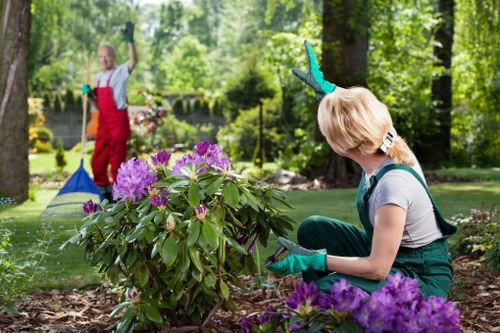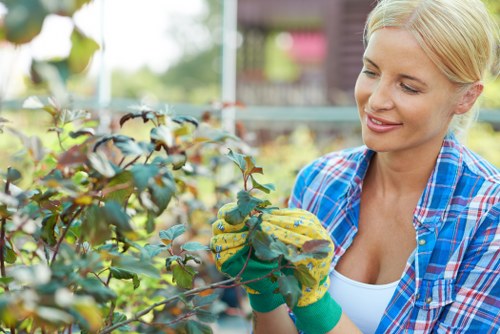Garden Maintenance in Victoria

Maintaining a beautiful garden in Victoria requires dedication, knowledge, and the right set of tools. Whether you’re a seasoned gardener or a novice, understanding the unique climate and soil conditions of Victoria is essential for thriving plant life.
Regular upkeep ensures that your garden remains vibrant and healthy throughout the year. This involves a combination of tasks such as pruning, weeding, watering, and fertilizing, all tailored to the specific needs of your plants.
One of the first steps in effective garden maintenance is to assess the current state of your garden. Identify any areas that need attention, such as overgrown shrubs, pest infestations, or nutrient deficiencies in the soil.

Seasonal Garden Care
Victoria’s climate can vary, so it’s important to adjust your garden maintenance routine according to the seasons. Each season brings its own set of challenges and opportunities for your garden.
Spring is a time for renewal. Start by clearing out any debris left over from the winter months. Plant new seedlings and apply a balanced fertilizer to promote healthy growth.
In the summer, focus on regular watering and pest control. Make sure your plants receive adequate moisture, especially during heatwaves, and keep an eye out for common pests that can damage your garden.

Pruning and Trimming
Pruning is essential for maintaining the shape and health of your plants. It helps to remove dead or diseased branches, allowing more sunlight and air to reach the inner parts of the plant.
Use sharp, clean tools to make precise cuts, and always prune at the right time of year for each specific plant. Over-pruning can stress plants, so it’s important to know the proper techniques.
Regular trimming also encourages new growth, ensuring that your garden remains lush and full throughout the growing season.

Soil Health and Fertilization
Healthy soil is the foundation of a thriving garden. Conducting regular soil tests can help you determine the pH levels and nutrient content, allowing you to amend the soil as needed.
Organic fertilizers are highly recommended as they improve soil structure and provide a slow release of nutrients. Composting kitchen scraps and garden waste can also enhance soil fertility naturally.
Mulching is another effective way to maintain soil health. It helps retain moisture, suppress weeds, and regulate soil temperature, providing an optimal environment for plant roots.

Watering Practices
Proper watering is crucial for garden maintenance. Overwatering can lead to root rot and other fungal diseases, while underwatering can cause plants to wilt and decline.
Implementing a consistent watering schedule based on the needs of different plants is key. Early morning is the best time to water, as it allows plants to absorb moisture before the heat of the day.
Using drip irrigation systems can enhance efficiency, ensuring that water is delivered directly to the plant roots with minimal waste.
Pest and Disease Management
Victoria gardens are susceptible to various pests and diseases that can hinder plant growth. Identifying issues early and taking appropriate measures is vital for maintaining plant health.
Integrated Pest Management (IPM) is an effective strategy that combines biological, cultural, and chemical methods to control pests with minimal environmental impact.
- Introduce beneficial insects like ladybugs to naturally reduce pest populations.
- Use organic pesticides as a last resort to minimize harm to non-target species.
- Maintain good garden hygiene to prevent the spread of diseases.
Choosing the Right Plants
Selecting plants that are well-suited to Victoria’s climate is a fundamental aspect of garden maintenance. Native plants are often the best choice as they are adapted to the local conditions and require less maintenance.
Drought-tolerant plants can thrive with minimal watering, making them ideal for areas with water restrictions. Additionally, consider the light and soil requirements of each plant to ensure they receive the optimal conditions for growth.
Consulting with local nurseries or gardening experts can provide valuable insights into the best plant varieties for your specific garden.
Lawn Care
A well-maintained lawn is an integral part of any garden. Regular mowing, aerating, and fertilizing are essential to keep your grass healthy and green.
Mowing should be done regularly, cutting no more than one-third of the grass height at a time to prevent stress. Keeping blades sharp ensures a clean cut, reducing the risk of disease.
Aerating the lawn helps improve soil structure, allowing water and nutrients to reach the roots more effectively.
Irrigation Systems
Installing an efficient irrigation system can greatly simplify garden maintenance. Automated systems ensure that plants receive consistent watering, reducing the need for manual intervention.
Consider systems like drip irrigation or soaker hoses, which deliver water directly to the base of plants, minimizing evaporation and runoff.
Regularly check and maintain your irrigation system to prevent leaks and ensure optimal performance.
Weeding and Mulching
Weeds compete with your plants for nutrients and water, making regular weeding a crucial task in garden maintenance.
Manual weeding is effective, especially when done consistently before weeds have a chance to establish deep roots. For larger gardens, consider using weeding tools to make the process easier.
Mulching not only suppresses weed growth but also helps retain soil moisture and regulate temperature. Organic mulches like bark, straw, or compost are beneficial as they decompose over time, enriching the soil.
Pruning Techniques
Effective pruning techniques can enhance the aesthetic appeal of your garden while promoting plant health. Different plants require different pruning methods, so it’s important to understand the specific needs of each species.
For flowering plants, prune after they have bloomed to encourage more vigorous growth and future blooms. For evergreen shrubs, light pruning during the growing season can help maintain their shape.
Always use clean and sharp tools to make precise cuts, reducing the risk of disease transmission among plants.
Seasonal Planting
Timing your planting schedule according to Victoria’s seasons can significantly impact the success of your garden. Certain plants thrive when planted in specific seasons, ensuring optimal growth and flowering.
Autumn is ideal for planting perennials and shrubs, allowing them to establish roots before the winter cold sets in. Spring is perfect for annuals and vegetables, taking advantage of the warming temperatures and longer daylight hours.
By planning your planting schedule, you can ensure a continuous display of color and productivity in your garden throughout the year.
Composting and Soil Enrichment
Composting is a sustainable way to recycle garden and kitchen waste into nutrient-rich soil amendments. It improves soil structure, enhances fertility, and promotes healthy plant growth.
Create a compost bin in your garden, layering organic materials like fruit scraps, vegetable peels, and garden clippings. Regularly turn the compost to aerate it, speeding up the decomposition process.
Use the finished compost to enrich your garden beds, providing a natural source of nutrients without the need for chemical fertilizers.
Professional Garden Maintenance Services
While DIY garden maintenance can be rewarding, enlisting the help of professional garden maintenance services in Victoria can ensure your garden remains in top condition year-round.
Professionals bring expertise and specialized equipment to handle complex tasks such as tree surgery, pest control, and landscape design. They can create tailored maintenance schedules that address the unique needs of your garden.
Investing in professional services not only saves you time and effort but also enhances the overall beauty and health of your outdoor space.
Choosing the Right Garden Maintenance Provider
Selecting a reliable garden maintenance provider in Victoria involves considering several factors. Look for companies with positive reviews, comprehensive service offerings, and experienced staff.
Ensure that the service provider understands the local climate and has a portfolio of successful garden projects in the area.
Don’t hesitate to ask for quotes and compare services to find the best fit for your garden’s specific needs.
Eco-Friendly Practices
Implementing eco-friendly garden maintenance practices not only benefits the environment but also promotes a healthier garden ecosystem.
Use organic fertilizers and pesticides to minimize chemical runoff and protect beneficial insects. Incorporate native plants that require less water and are resistant to local pests.
Consider rainwater harvesting systems to reduce your garden’s reliance on municipal water supplies, promoting sustainability and reducing utility costs.
Lighting and Irrigation Enhancements
Adding lighting to your garden can extend its usability into the evening hours and highlight key features. Solar-powered lights are an eco-friendly option that reduces energy consumption.
Advanced irrigation systems, such as smart controllers, allow you to automate watering schedules based on weather conditions, ensuring efficient water usage.
These enhancements not only improve the functionality of your garden but also enhance its aesthetic appeal.
Maintaining Garden Tools and Equipment
Proper maintenance of garden tools and equipment is essential for efficient garden maintenance. Clean tools after each use to prevent rust and prolong their lifespan.
Sharpen blades regularly to ensure clean cuts, which are less damaging to plants. Store tools in a dry place to avoid moisture-related issues.
Investing in high-quality tools can make garden maintenance tasks easier and more enjoyable, ultimately contributing to a healthier garden.
Winter Garden Care
Winter brings its own set of challenges for garden maintenance in Victoria. Protect plants from frost by using mulch or frost blankets, and ensure that perennial plants are adequately sheltered.
Prune dead branches and clean up fallen leaves to prevent the spread of diseases and pests. This also prepares your garden for a fresh start in the spring.
Even during the colder months, some maintenance tasks can keep your garden in good shape and ready for the warming seasons ahead.
Conclusion
Effective garden maintenance in Victoria involves a combination of regular care, seasonal adjustments, and the use of sustainable practices. By understanding the local climate and soil conditions, selecting appropriate plants, and implementing proper maintenance techniques, you can create a thriving and beautiful garden.
Whether you choose to maintain your garden yourself or enlist the help of professional services, consistent effort and attention to detail are key to ensuring your outdoor space remains a source of pride and enjoyment.
Contact us today to learn more about our garden maintenance services and how we can help you achieve the garden of your dreams in Victoria.

